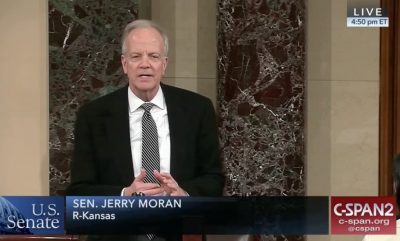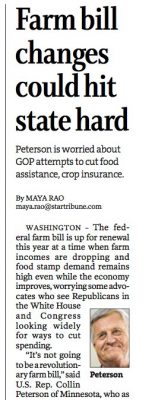The House Agriculture Committee unveiled a draft farm bill Friday that would revamp a key international food aid program, boost risk management options for specialty crop growers and nullify California's…
Farm Bill- Disaster Bill Seen as First Step, SNAP Concerns
Farm Bill: Disaster Assistance Amid Crowded Agenda
An update posted on Tuesday at the National Sustainable Agriculture Coalition (NSAC) blog indicated that, “Less than two weeks into the new year, and Congress already has an incredibly full plate. Both the House and Senate return to work this week (the Senate has officially been back since last week), and will need to immediately dig in their massive to-do lists, not least of which include finalizing fiscal year (FY) 2018 appropriations legislation, preparing for the FY 2019 budget, and tackling the soon-to-expire 2014 Farm Bill.”
The NSAC update explained that, “The end of FY 2017 was officially on September 30, 2017. For the last several months, Congress has been unable to agree on new spending levels for FY 2018, and so has been forced to pass a series of Continuing Resolutions (CR) (the most recent of which came in at the end of the 2017) in order to keep the government and essential programs running. All the CRs do, however, is prolong FY 2017 spending levels. Congress therefore has a whole lot to do in the weeks ahead to if they hope to finally set new spending levels for FY 2018.
“The most recent CR keeps the government funded through through January 19 – a deadline that is now less than two weeks away.”
In addition, this week’s NSAC update pointed out that, “Shortly before the holidays, the House passed a disaster relief bill that, in addition to providing relief to areas struck by natural disasters in recent months, also contains controversial provisions to benefit cotton farmers and dairy producers. The House bill would add cotton back into the Title I commodity programs and also waive a cap on livestock insurance in order to help the U.S. Department of Agriculture (USDA) provide better dairy insurance options.”

The update added that, “The pending Senate agriculture appropriations bill, which will eventually get wrapped into any omnibus spending bill, already contains similar provisions to the House disaster bill for cotton, and much stronger provisions for dairy. There appears to be a very good chance that the two cotton and dairy provisions will be melded, the SNAP cut jettisoned, and the resulting provisions added to either the disaster bill or the omnibus spending package.”
Meanwhile, a news release on Sunday from the American Farm Bureau Federation stated that,
Passing a disaster assistance bill for agriculture will set the stage for the next farm bill, Sen. Jerry Moran (R-Kan.) told workshop attendees at the American Farm Bureau Federation’s 2018 Annual Convention & IDEAg Trade Show.
“Ideally, lawmakers will address contentious issues related to cotton and dairy programs in the disaster bill and ‘get them out of the way‘ before the farm bill debate heats up, according to Moran. He noted that the Senate is likely to take up the House-passed disaster aid bill, amend it and send it back as a package.”
The news release indicated that, “The House is ahead of the Senate in terms of progress on the farm bill, and overall timing of the legislation is uncertain. Moran did predict the Senate will release its version of the farm bill in the first few months of 2018.”
On Tuesday Sen. Moran spoke about agricultural issues on the Senate floor (video replay, transcript) and noted that, “Farm Bureau members from across the country made it clear to me, first of all, that they would like to see Congress—Republicans and Democrats in the House and the Senate—and the administration work together in a bipartisan fashion to get a farm bill done and, prior to that, to get a disaster relief bill completed, which I hope we will do yet this month on the Senate floor—both the disaster bill that needs to get to the President’s desk as soon as possible and also a farm bill that needs to be completed in a timely fashion.”

Shaley Sanders reported on Monday at KCBD-TV (Lubbock, Tex.) that, “District 19 Congressman Jodey Arrington said a solution is underway to put cotton back in the safety net of the farm bill.
“Arrington said he worked with Chairman Mike Conaway and the leadership in the House of Representatives to include cotton on the supplemental appropriations bill, something they voted on during the last day of the session in December.”
The update noted that, “Arrington said the advantage of having the cotton fix come out of the emergency supplemental, is the timing. It would be effective immediately for the 2018 season. He said if they wait and apply cotton to the farm bill, then it would not apply until the 2019 season.”
Farm Bill: SNAP Concerns
On a separate issue, Maya Rao reported on the front page of Tuesday’s Minneapolis Star-Tribune that, “The federal farm bill is up for renewal this year at a time when farm incomes are dropping and food stamp demand remains high even while the economy improves, worrying some advocates who see Republicans in the White House and Congress looking widely for ways to cut spending.
“‘It’s not going to be a revolutionary farm bill,’ said U.S. Rep. Collin Peterson of Minnesota, who as ranking Democrat on the House Agriculture Committee will play a central role in congressional negotiations. ‘We don’t have the money.'”

The article explained that, “Peterson spoke in an interview last week about his hopes for the spending package, and fears that ideological fights over food stamps could derail the bill this time around. The current farm law expires in September, and the House Agriculture Committee could take its first votes on a replacement as early as February.
“Peterson conveyed worry about signals from the White House, particularly White House Budget Director Mick Mulvaney, a former Republican congressman.
‘When he was in the House, he spent his entire time trying to get rid of the farm program, so he’s not our friend, and he’s doing everything he can to undermine the amount of money we have,’ Peterson said. ‘They’re letting him run wild at this point.’
And Rep. John Yarmuth (D., Ky.), the Ranking Member of the House Budget Committee, released a paper on Tuesday (“The Farm Bill and the Budget: What you Need to Know“) which stated in part that, “Recent Republican proposals would fundamentally alter SNAP’s funding structure, using the guise of ‘state flexibility’ to essentially turn SNAP into a block grant that will provide insufficient funding to cover all eligible individuals. This would require cash-strapped states to either fill in the gap or take away food assistance from millions of working families, children, and seniors. Turning SNAP into a block grant would eliminate the program’s ability to respond immediately and effectively during economic downturns, thereby limiting the ability of families in need to access nutrition assistance when facing hard economic times.”
Senate Ag Committee- New Members
The Associated Press reported on Tuesday that Sen. Chris Van Hollen (D., Md.) will be moving from the Senate Ag Committee to the the Environment and Public Works Committee.
And Joseph Morton reported on Wednesday at the Omaha World-Herald Online that, “Nebraska has a seat on the Senate Agriculture Committee once more.
“Republican Sen. Deb Fischer announced Tuesday that she had joined the panel and touted her personal background in the field.
In my new role on @SenateAgGOP, I look forward to working together with Nebraskans, Chairman @SenPatRoberts, and my colleagues on the Ag committee to advance the smart policies #farmers and #ranchers need to do their job of feeding our hungry world https://t.co/L1GzLHM9x8 pic.twitter.com/gDapD4uyVN
— Senator Deb Fischer (@SenatorFischer) January 9, 2018
“‘Agriculture is the backbone of Nebraska’s economy,’ Fischer said during a conference call with reporters. ‘And it’s a big part of my own life.'”
A separate Associated Press article from Tuesday reported that, “Sen. Tina Smith [D. Minn.] has a spot on the Senate’s Agriculture Committee and several other critical panels.
This afternoon I sat down with Gary Wertish, President of @MNFarmersUnion, to talk about Minnesota ag priorities and to tell him that I'll be a strong voice for our state's farmers and ranchers as a member of @SenateAgDems. pic.twitter.com/fsBNgLVrkd
— Tina Smith (@SenTinaSmith) January 9, 2018
“Smith was sworn in last week to replace Al Franken as Minnesota’s junior senator after Franken resigned amid a storm of sexual misconduct allegations. But the Democrat’s committee assignments weren’t announced until Tuesday.”





